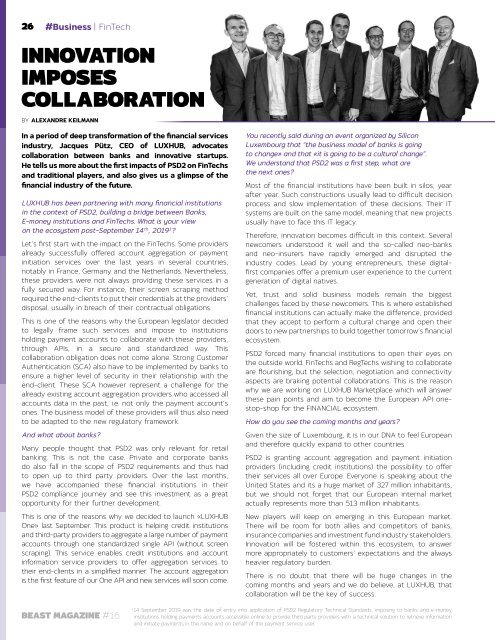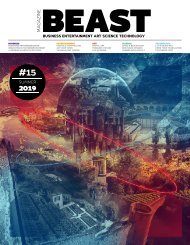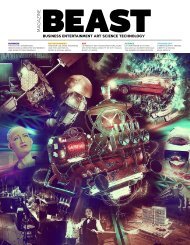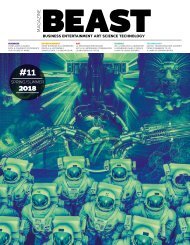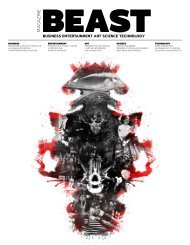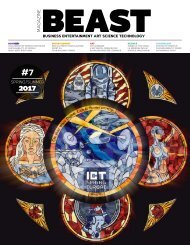Magazine BEAST #16 2019
Create successful ePaper yourself
Turn your PDF publications into a flip-book with our unique Google optimized e-Paper software.
26<br />
#Business | FinTech<br />
INNOVATION<br />
IMPOSES<br />
COLLABORATION<br />
BY ALEXANDRE KEILMANN<br />
In a period of deep transformation of the financial services<br />
industry, Jacques Pütz, CEO of LUXHUB, advocates<br />
collaboration between banks and innovative startups.<br />
He tells us more about the first impacts of PSD2 on FinTechs<br />
and traditional players, and also gives us a glimpse of the<br />
financial industry of the future.<br />
LUXHUB has been partnering with many financial institutions<br />
in the context of PSD2, building a bridge between Banks,<br />
E-money institutions and FinTechs. What is your view<br />
on the ecosystem post-September 14 th , <strong>2019</strong> 1 ?<br />
Let’s first start with the impact on the FinTechs. Some providers<br />
already successfully offered account aggregation or payment<br />
initiation services over the last years in several countries,<br />
notably in France, Germany and the Netherlands. Nevertheless,<br />
these providers were not always providing these services in a<br />
fully secured way. For instance, their screen scraping method<br />
required the end-clients to put their credentials at the providers’<br />
disposal, usually in breach of their contractual obligations.<br />
This is one of the reasons why the European legislator decided<br />
to legally frame such services and impose to institutions<br />
holding payment accounts to collaborate with these providers,<br />
through APIs, in a secure and standardized way. This<br />
collaboration obligation does not come alone. Strong Customer<br />
Authentication (SCA) also have to be implemented by banks to<br />
ensure a higher level of security in their relationship with the<br />
end-client. These SCA however represent a challenge for the<br />
already existing account aggregation providers who accessed all<br />
accounts data in the past, i.e. not only the payment account’s<br />
ones. The business model of these providers will thus also need<br />
to be adapted to the new regulatory framework.<br />
And what about banks?<br />
Many people thought that PSD2 was only relevant for retail<br />
banking. This is not the case. Private and corporate banks<br />
do also fall in the scope of PSD2 requirements and thus had<br />
to open up to third party providers. Over the last months,<br />
we have accompanied these financial institutions in their<br />
PSD2 compliance journey and see this investment as a great<br />
opportunity for their further development.<br />
This is one of the reasons why we decided to launch «LUXHUB<br />
One» last September. This product is helping credit institutions<br />
and third-party providers to aggregate a large number of payment<br />
accounts through one standardized single API (without screen<br />
scraping). This service enables credit institutions and account<br />
information service providers to offer aggregation services to<br />
their end-clients in a simplified manner. The account aggregation<br />
is the first feature of our One API and new services will soon come.<br />
You recently said during an event organized by Silicon<br />
Luxembourg that “the business model of banks is going<br />
to change» and that «it is going to be a cultural change”.<br />
We understand that PSD2 was a first step, what are<br />
the next ones?<br />
Most of the financial institutions have been built in silos, year<br />
after year. Such constructions usually lead to difficult decision<br />
process and slow implementation of these decisions. Their IT<br />
systems are built on the same model, meaning that new projects<br />
usually have to face this IT legacy.<br />
Therefore, innovation becomes difficult in this context. Several<br />
newcomers understood it well and the so-called neo-banks<br />
and neo-insurers have rapidly emerged and disrupted the<br />
industry codes. Lead by young entrepreneurs, these digitalfirst<br />
companies offer a premium user experience to the current<br />
generation of digital natives.<br />
Yet, trust and solid business models remain the biggest<br />
challenges faced by these newcomers. This is where established<br />
financial institutions can actually make the difference, provided<br />
that they accept to perform a cultural change and open their<br />
doors to new partnerships to build together tomorrow’s financial<br />
ecosystem.<br />
PSD2 forced many financial institutions to open their eyes on<br />
the outside world. FinTechs and RegTechs wishing to collaborate<br />
are flourishing, but the selection, negotiation and connectivity<br />
aspects are braking potential collaborations. This is the reason<br />
why we are working on LUXHUB Marketplace which will answer<br />
these pain points and aim to become the European API onestop-shop<br />
for the FINANCIAL ecosystem.<br />
How do you see the coming months and years?<br />
Given the size of Luxembourg, it is in our DNA to feel European<br />
and therefore quickly expand to other countries.<br />
PSD2 is granting account aggregation and payment initiation<br />
providers (including credit institutions) the possibility to offer<br />
their services all over Europe. Everyone is speaking about the<br />
United States and its a huge market of 327 million inhabitants,<br />
but we should not forget that our European internal market<br />
actually represents more than 513 million inhabitants.<br />
New players will keep on emerging in this European market.<br />
There will be room for both allies and competitors of banks,<br />
insurance companies and investment fund industry stakeholders.<br />
Innovation will be fostered within this ecosystem, to answer<br />
more appropriately to customers’ expectations and the always<br />
heavier regulatory burden.<br />
There is no doubt that there will be huge changes in the<br />
coming months and years and we do believe, at LUXHUB, that<br />
collaboration will be the key of success.<br />
<strong>BEAST</strong> MAGAZINE <strong>#16</strong><br />
1 <br />
14 September <strong>2019</strong> was the date of entry into application of PSD2 Regulatory Technical Standards, imposing to banks and e-money<br />
institutions holding payments accounts accessible online to provide third party providers with a technical solution to retrieve information<br />
and initiate payments in the name and on behalf of the payment service user.


